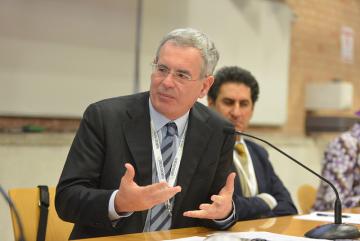
The Intergovernmental Panel on Climate Change (IPCC) completed the election of its Bureau on 8 October, including the re-election of Carlo Carraro, Co-Chair of the GGKP Advisory Committee and Professor at Ca’ Foscari University of Venice, as Vice-Chair of Working Group III. Professor Carraro has been Vice-Chair of the Working Group III and member of the IPCC Bureau since 2008.
The election took place in Dubrovnik, Croatia, where the IPCC held its 42nd Session from 5-8 October 2015. The IPCC Assembly was attended by delegations from over 140 countries. The Bureau will lead the IPCC as it works on its forthcoming Sixth Assessment Report (AR6), expected to be completed in 5-7 years. The IPCC completed its Fifth Assessment Report (AR5) in November 2014.
Professor Carraro is Professor of Environmental Economics and Econometrics at Ca’ Foscari University of Venice, Director of the Climate Change and Sustainable Development Programme of the Fondazione Eni Enrico Mattei, and Director of the International Centre for Climate Governance. From 2009 to 2014 he was President of the Ca’ Foscari University of Venice and was instrumental in the organization of the GGKP’s Third Annual Conference. The conference, jointly hosted in January 2015 by Ca’Foscari University of Venice, the United Nations Environment Programme (UNEP) and The Energy and Resources Institute of India, focused on the topic of 'Fiscal Policy and the Green Economy Transition'. Immediately preceding the conference, Professor Carraro was elected as the Co-Chair of the GGKP Advisory Committee.
What is the IPCC?
The Intergovernmental Panel on Climate Change (IPCC) assesses scientific, technical and socio-economic information relevant for the understanding of climate change, its potential impacts and options for adaptation and mitigation. It is open to all Members of the United Nations and of the World Meteorological Organization (WMO).
The IPCC Working Group III assesses all relevant options for mitigating climate change through limiting or preventing greenhouse gas emissions and enhancing activities that remove them from the atmosphere.
